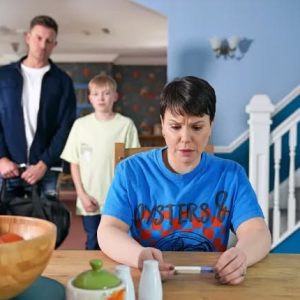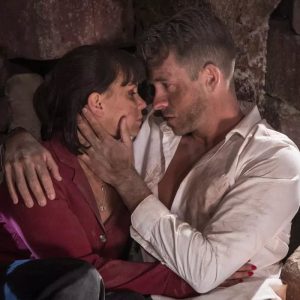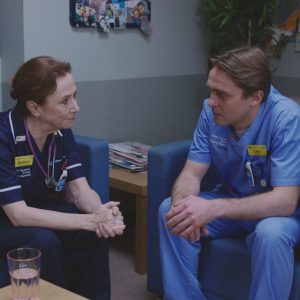The Channel 4 soap, known for weaving socially conscious narratives into its fabric,
took another bold step forward by delving deep into Ro’s emotional turmoil. As audiences watched Ro
wrestle with identity, isolation, and inner conflict, the scenes crescendoed into a heart-rending phone call—a quiet act of bravery that spoke volumes about the courage it takes to ask for help.
Ro Browning’s Struggle Comes to a Boil
Ro, played with raw vulnerability by actor Owen Warner, has long been a complex character, balancing personal doubts and the pressure of living up to expectations in a world that often demands conformity. In recent weeks, viewers have witnessed Ro grappling with questions surrounding his gender and sexual identity—something he has attempted to keep buried beneath a façade of calm and control.
The emotional weight has become increasingly evident. Subtle shifts in his demeanor, growing moments of detachment from friends, and heated confrontations have all signaled an internal storm brewing beneath the surface. The toll of masking his truth was finally laid bare in this week’s episode, as Ro found himself alone, at a breaking point, unsure of where to turn—until he made a life-changing call.
The Power of a Phone Call
In one of the episode’s most affecting sequences, the camera lingered on Ro, curled up in his room, clutching his phone with trembling hands. The silence was deafening. What followed was a breathtakingly honest portrayal of vulnerability as Ro dialed the LGBTQ+ helpline, a fictional stand-in for real-world services like Switchboard or The Trevor Project.
His voice cracked. His words came haltingly. But they came. “I don’t know who I am anymore,” Ro admitted to the anonymous voice on the other end. It was a line delivered with such aching sincerity that it encapsulated the core of the storyline: identity isn’t always a linear journey, and sometimes, just speaking the truth out loud can be the bravest step of all.
The helpline counselor—a calm, empathetic voice played by guest star Amanda Wilton—provided reassurance and a listening ear, underscoring the importance of mental health resources and peer support within the LGBTQ+ community. It was a moment of catharsis, not just for Ro, but for countless viewers who may see reflections of their own journeys in his.
Family Ties and Fractured Bonds
Ro’s struggle didn’t occur in a vacuum. The Browning family, while loving, has been portrayed as a household where silence often replaces meaningful conversation, especially around topics deemed “too difficult.” His relationship with older brother Warren remains tense and layered, their dynamic defined by protective instincts that sometimes come off as emotionally repressive.
In contrast, Ro’s connection with his mother, Norma, is warm but equally complicated. Norma has always sensed her son’s inner battles, but her inability to bridge the emotional gap left Ro feeling even more alone. These nuanced family portrayals offer Hollyoaks fans a glimpse into how even well-meaning families can unwittingly create environments where loved ones feel they must hide parts of themselves.
The helpline call becomes all the more significant in this context—it represents not just a plea for help, but a bid for understanding in a world where Ro feels misunderstood by those closest to him.
Community Support and Broader Implications
In the days leading up to the episode, Channel 4 released teaser clips and a content warning, emphasizing the emotional intensity of the scenes. The network also partnered with LGBTQ+ charities to ensure viewers had access to support resources. The show’s social media accounts were flooded with messages from fans applauding Hollyoaks for its sensitive and realistic portrayal of Ro’s crisis.
What makes this storyline resonate so deeply is its grounding in real-life experiences. According to recent statistics, LGBTQ+ youth are significantly more likely to face mental health challenges, including depression and suicidal ideation. Representation of these struggles on mainstream platforms like Hollyoaks not only validates those experiences but helps break the stigma surrounding them.
Executive producer Lucy Allan commented ahead of the episode’s airing: “We knew from the outset that Ro’s journey would be about more than labels. It’s about identity, yes—but also about silence, fear, courage, and ultimately, finding your voice. This phone call was always intended to be the emotional turning point.”
A New Chapter for Ro
As the episode closed, Ro wiped away tears, the light from his phone screen illuminating his face in the darkness—a quiet visual metaphor for the hope that can emerge from even the darkest nights. For the first time in weeks, there was a hint of relief in his expression. Not because everything was solved, but because he no longer felt alone.
This moment opens a door for future episodes to explore the next chapter in Ro’s journey with the sensitivity and depth that Hollyoaks has become known for. Will Ro come out to his family? How will his relationships evolve as he steps into a more authentic version of himself? And what role will the community play in lifting him up?
Audience Reactions and Cultural Impact
Within hours of airing, the episode was trending on X (formerly Twitter), with hashtags like #Hollyoaks and #RoBrowning lighting up the platform. Fans praised Owen Warner’s performance as “career-defining” and “gut-wrenchingly real.” Many shared their own stories of coming out or calling a helpline, highlighting the episode’s deep emotional resonance.
“I saw myself in Ro tonight,” one user wrote. “That scene saved me.”
Others applauded the show for its responsible storytelling, encouraging more productions to follow suit in portraying LGBTQ+ issues not as plot devices, but as lived realities deserving of respect and care.
In shining a light on the quiet strength it takes to ask for help, Hollyoaks has once again proven its place at the forefront of meaningful television. Ro’s phone call wasn’t just a dramatic turning point—it was a beacon of hope for anyone who’s ever struggled to find their voice. And in that moment, Hollyoaks didn’t just tell a story. It changed lives.





